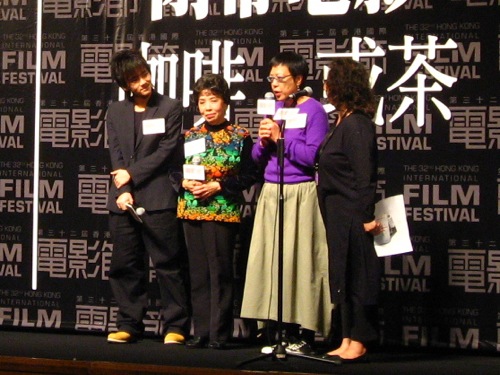Attended the premiere of Ann Hui’s (許鞍華) latest work, The Way We Are (天水圍的日輿夜) tonight. The director was there, and, even better, Idy Chan (陳玉蓮) too (but I didn’t set eyes on her). The legendary beauty makes a slightly awkward cameo in the movie, but wowed the audience anyway.
A literal translation of the title would be ‘Day and Night in Tin Shui Wai’. First, a bit of background. Tin Shui Wai, located near the border, is known as a Problem Area. Populated by low-income families, riddled with debt, deprivation and depression, it’s been the focus of much attention and become a byword for despair.
Grim news about crime, high unemployment and suicides (including those involving parents who ‘take their children with them’) has been making its way from there. Hui’s movie is among the vanguard of filmic takes on this frontier town.
Hui takes a light touch to the publicised issues, however. She offers only subtle, gentle, veiled or unspoken references to the seedy underbelly and what have you, and concentrates instead on the toughness and tenderness that help the unheralded majority soldier on.
Anchored by yet another shining example of the Hui Woman Warrior, the movie warms, and glues, and threads, rather than rends. It is Hong Kong’s story of success all over again in this microcosm of a Third World bubbling just within the ken of a financial powerhouse.
‘Things are not so bad,’ Hui seems to be saying.
Newcomer Juno Leung (梁進龍) as an aimless albeit filial youth was commendable, though amply aided by the way the film sneaks itself into your affections by playing with expectations without delivering pat answers — except maybe that friendship and family are what keeps us on course amidst the buffeting of time and fortune.
The rock of the film was undoubtedly Pau Hei-ching (鮑起靜), who played Leung’s mum — but the real heartbreaker for me was Chan Lai-wun (陳麗雲), who played a lonely old woman. How she rendered the character reminded me so very much of my grandma — and perhaps it was meant to be this way.
The movie was in high definition (HD), which made the mundane appear hyperreal — my senses were devoured by the clarity of intimacy. I found myself hoping to see Singapore and Singaporeans through such a clear lens — take that what way you will.
What with the credits being surprisingly short and the hoopla over the HD-ness of the film (we were asked by some HD guy to be aware of what we were seeing, in addition to watching the drama onscreen), it also seemed that messages about modern life weren’t confined to the film.
I leave you with a shot from the introduction — from left to right: Juno Leung, Chan Lai-wun (who cleaned up really well), Ann Hui, a rather forceful translator.
